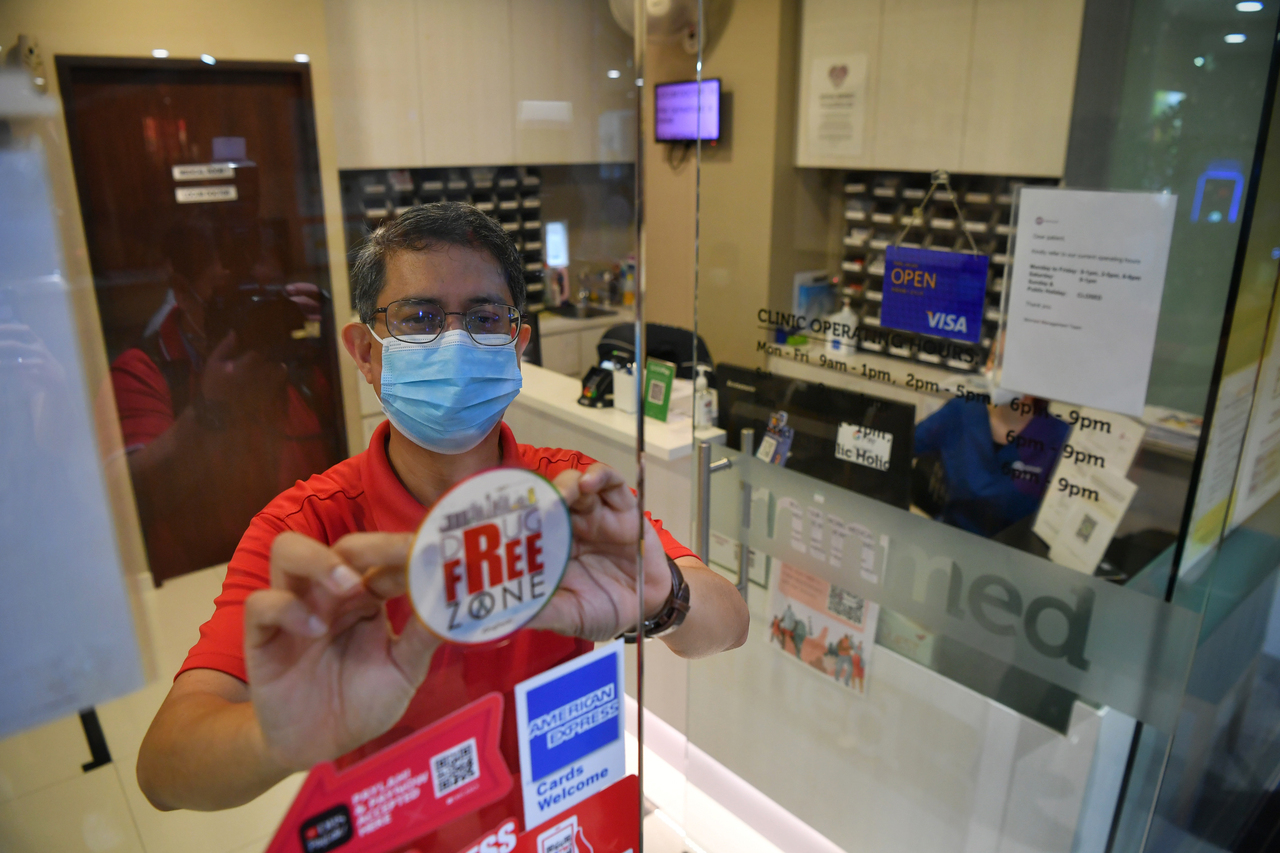Work needed to prevent the young from becoming next generation of drug abusers: Faishal
Sign up now: Get ST's newsletters delivered to your inbox

Minister of State for Home Affairs Muhammad Faishal Ibrahim pasting a “Drug Free Zone” decal at a clinic in Northpoint City mall early last year.
ST PHOTO: CHONG JUN LIANG
SINGAPORE - Fewer drug addicts were arrested last year, but the authorities are concerned that 60 per cent of new abusers nabbed were aged 30 and under, a group that they say holds liberal drug views.
If nothing is done to address this and other challenges, there is a real risk of young people becoming the next generation of drug abusers, Minister of State for Home Affairs Muhammad Faishal Ibrahim has warned.
“It is worrying that young people are adopting more liberal attitudes towards drugs,” he said, citing a survey conducted in 2020 by the National Council Against Drug Abuse.
The survey showed young people’s support for Singapore’s zero-tolerance approach towards drugs was 82.5 per cent, compared with 88.3 per cent for those above the age of 30.
“We need to do more to reach out to our youth to prevent them from falling prey to drugs, before they form the next generation of drug abusers,” Associate Professor Faishal said in response to queries from The Sunday Times.
Spelling out the challenges, he said drugs are now easily available, alternatives to the zero-tolerance stance are being championed, there is a shift towards digital platforms for transactions, and lifestyles are increasingly being shaped by media sources and celebrities with liberal drug views.
Methamphetamine, or Ice, is the most commonly abused drug here, especially among the young.
The Central Narcotics Bureau (CNB), in releasing its annual statistics last month, said of the 2,724 abusers arrested last year, 58 per cent were found to have abused methamphetamine. The drug’s popularity is even higher among new abusers, with 76 per cent of the 937 arrested last year abusing it.
Prof Faishal said: “The global production and trafficking of methamphetamine have increased to alarming levels, and the market for new psychoactive substances continues to evolve. There is also a push in some countries for alternative drug control policies that go against our zero-tolerance stance, for example, drug legalisation, particularly cannabis.”
Cannabis is among the top three most abused drugs here and is viewed by some young people as a soft drug. According to the CNB, the amount seized last year more than doubled to 105kg from 43kg the year before.
A recent survey by public opinion company YouGov, done in collaboration with ST, showed that about one in four young people aged 18 to 24 felt that cannabis was not harmful. When it came to methamphetamine, only 1 per cent felt the drug was not harmful. Perceptions were similar when it came to heroin, with only 3 per cent in that age group thinking it was not harmful.
But cannabis’ potency has almost quadrupled, said Prof Faishal, citing last year’s World Drug Report.
“Yet the percentage of adolescents who perceive cannabis as harmful has dropped by as much as 40 per cent. This is despite the evidence linking regular use to health problems, particularly in young people, and the correlation between potency and harm,” he added.
As for new psychoactive substances, which mimic the effects of other controlled drugs, CNB figures showed there were 3,150 tablets, 245 bottles, nine stamps and 6.32kg of NPS seized last year – compared with 305 tablets, 33 bottles and 6.2kg seized in 2020.
Law enforcement agencies around the world see these substances as a challenge, in part because of the number of variants that can be produced by modifying the chemical structure of existing substances to evade detection.
Another challenge is that NPS and other illicit drugs are now being bought and sold on digital platforms.
“More than 200 drug offenders who conducted drug transactions on the Telegram platform have been arrested, and CNB has seized more than 14kg of Ice, 7.6kg of cannabis, 400g of heroin and an assortment of other drugs transacted through Telegram,” said Prof Faishal.
And the sellers are getting younger.
In an operation last month, CNB arrested three men aged 21 to 31, and seized about 9kg of drugs with an estimated street value of $726,000. It also seized more than $40,000 in cash and found luxury items such as branded clothing in a private residential unit in Upper Serangoon Road.
Prof Faishal said young people’s views on drugs are being swayed at an early age. “The danger is... when they are exposed to films and songs with a drug theme, particularly those that normalise drug abuse or portray drug abuse as a fun activity, or explicitly encourage drug-taking,” he said. “But behind the glamour, drug abuse has destroyed the lives of many, and even caused a number of celebrities to die from overdose.”
Singapore's first line of defence is preventive drug education such as after-school engagement programmes and anti-drug video and montage competitions targeted at the youth.
But Prof Faishal said parents play an important role as well.
"We should never assume that our children should have known better. Parental influence has been found to be effective in deterring drug abuse. Engage them early."
He also called on the wider community - families, educators, counsellors and the young as well - to be an ally in the fight against drugs.
Drug abuse exacts a heavy price on abusers, their families, and ultimately, society, he said.
"Hence, we continue to take a tough stance against drug abuse and impose mandatory rehabilitation to give abusers adequate treatment and support to overcome their addiction."


